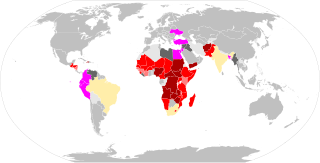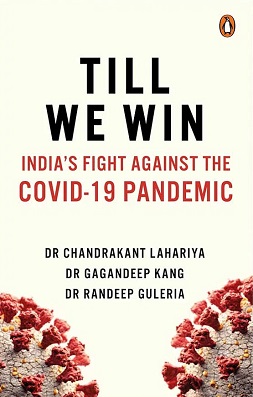Related Research Articles

Harsh Vardhan is a former Indian politician and otorhinolaryngologist. He had served as the Minister of Health and Family Welfare, Minister of Science and Technology and Minister of Earth Sciences in the BJP-led NDA government of Prime Minister Narendra Modi from 30 May 2019 to 7 July 2021. He represents Chandni Chowk in Delhi as a Member of Parliament in the 17th Lok Sabha. He was elected to the office of Chairperson of the Executive Board of the World Health Organization from 22 May 2020. Vardhan has been prominent in the Indian government's response to the COVID-19 pandemic. He later resigned from his cabinet post ahead of the cabinet reshuffle in July 2021.
Tim Seifert is a New Zealand international cricketer. He was part of New Zealand's squad for the 2014 ICC Under-19 Cricket World Cup, and made his international debut for the New Zealand cricket team in February 2018.

The 2020–23 ICC Men's Cricket World Cup Super League was the first edition of the ICC Cricket World Cup Super League, a One Day International (ODI) league. The league took place from July 2020 to May 2023, and served as part of the 2023 Cricket World Cup qualification process.
The 2022 Asia Cup was the 15th edition of the Asia Cup cricket tournament, with the matches played as Twenty20 Internationals (T20Is) during August and September 2022 in the United Arab Emirates. Originally scheduled to be held in September 2020, the tournament was postponed in July 2020 due to the COVID-19 pandemic. It was then rescheduled to take place in June 2021, before being postponed once again. Pakistan was scheduled to host the tournament after retaining the rights to host the 2022 edition. However, in October 2021, the Asian Cricket Council (ACC) announced that Sri Lanka would host the tournament in 2022, with Pakistan co-hosting the 2023 edition with the former. India were the defending champions, and were eliminated in the Super Four stage in this edition. Sri Lanka beat Pakistan by 23 runs in the final, to win their sixth title and their first in T20I format.
The COVID-19 pandemic in India is a part of the worldwide pandemic of coronavirus disease 2019 caused by severe acute respiratory syndrome coronavirus 2. As of 11 August 2024, according to Indian government figures, India has the second-highest number of confirmed cases in the world with 45,041,435 reported cases of COVID-19 infection and the third-highest number of COVID-19 deaths at 533,623 deaths. In October 2021, the World Health Organization estimated 4.7 million excess deaths, both directly and indirectly related to COVID-19 to have taken place in India.
The COVID-19 pandemic in Sri Lanka is part of the ongoing worldwide pandemic of coronavirus disease 2019 (COVID-19) caused by the severe acute respiratory syndrome coronavirus 2 virus. The first case of the virus in Sri Lanka was confirmed on 27 January 2020, after a 44-year-old Chinese woman from Hubei, China, was admitted to the Infectious Disease Hospital in Angoda, Sri Lanka. As of 15 December 2022, a total of 671,776 COVID-19 cases had been recorded in the country, 654,919 patients had recovered from the disease, and 16,814 patients had died.

Syra Madad is an American pathogen preparedness expert and infectious disease epidemiologist. Madad is the Senior Director of the System-wide Special Pathogens Program at NYC Health + Hospitals where she is part of the executive leadership team which oversees New York City's response to the Coronavirus disease 2019 pandemic in the city's 11 public hospitals. She was featured in the Netflix documentary series Pandemic: How to Prevent an Outbreak and the Discovery Channel documentary The Vaccine: Conquering COVID.

Bonnie J. Fraser Henry is a Canadian epidemiologist, physician, and public servant who has been the provincial health officer at the British Columbia Ministry of Health since 2014. Henry is also a clinical associate professor at the University of British Columbia. She is a specialist in public health and preventive medicine, and is a family doctor. In her role as provincial health officer, Henry notably led the response to COVID-19 in British Columbia (BC).

Countries and territories in South Asia have been affected by the COVID-19 pandemic. The first South Asian country to report a confirmed case was Nepal, which documented its first case on 23 January 2020, in a man who had returned from Wuhan on 9 January. As of 2 July, at least one case of COVID-19 has been reported in every country in South Asia. Afghanistan, Bangladesh, Pakistan and Maldives have implemented lockdowns, Sri Lanka has responded with quarantine curfews while India and Nepal have declared a country-wide lockdown. Countries have also instituted various levels of restrictions on international travel, some countries have completely sealed off their land borders and grounded most international flights.
The first case of the COVID-19 pandemic in India was reported on 30 January 2020, originating from China. Slowly, the pandemic spread to various states and union territories including the Indian-administered union territory of Jammu and Kashmir. Two suspected cases with high virus load were detected and isolated on 4 March in Government Medical College, Jammu. One of them became the first confirmed positive case on 9 March 2020. Both individuals had a travel history to Iran.
The first case of the COVID-19 pandemic in India was reported on 30 January 2020. Slowly, the pandemic spread to various states and union territories including the state of Uttarakhand. The first case was recorded in this region on 15 March.

The COVID-19 pandemic has impacted healthcare workers physically and psychologically. Healthcare workers are more vulnerable to COVID-19 infection than the general population due to frequent contact with infected individuals. Healthcare workers have been required to work under stressful conditions without proper protective equipment, and make difficult decisions involving ethical implications. Health and social systems across the globe are struggling to cope. The situation is especially challenging in humanitarian, fragile and low-income country contexts, where health and social systems are already weak. Services to provide sexual and reproductive health care risk being sidelined, which will lead to higher maternal mortality and morbidity.

A systematic review notes that children with COVID-19 have milder effects and better prognoses than adults. However, children are susceptible to "multisystem inflammatory syndrome in children" (MIS-C), a rare but life-threatening systemic illness involving persistent fever and extreme inflammation following exposure to the SARS-CoV-2 virus.

During the COVID-19 pandemic, food insecurity intensified in many places. In the second quarter of 2020, there were multiple warnings of famine later in the year. In an early report, the Nongovernmental Organization (NGO) Oxfam-International talks about "economic devastation" while the lead-author of the UNU-WIDER report compared COVID-19 to a "poverty tsunami". Others talk about "complete destitution", "unprecedented crisis", "natural disaster", "threat of catastrophic global famine". The decision of the WHO on 11 March 2020, to qualify COVID as a pandemic, that is "an epidemic occurring worldwide, or over a very wide area, crossing international boundaries and usually affecting a large number of people" also contributed to building this global-scale disaster narrative.

The United Nations response to the COVID-19 pandemic has been led by its Secretary-General and can be divided into formal resolutions at the General Assembly and at the Security Council (UNSC), and operations via its specialized agencies and chiefly the World Health Organization in the initial stages, but involving more humanitarian-oriented agencies as the humanitarian impact became clearer, and then economic organizations, like the United Nations Conference on Trade and Development, the International Labour Organization, and the World Bank, as the socioeconomic implications worsened.
The Sri Lanka cricket team toured Bangladesh in May 2022 to play two Test matches. The Test series formed part of the 2021–2023 ICC World Test Championship. The fixtures for the tour were confirmed in March 2022. In June 2020, the International Cricket Council (ICC) relaxed its rules on using neutral match officials, due to the impact of the COVID-19 pandemic. In April 2022, the ICC confirmed that neutral umpires would return to Test match cricket, with Richard Kettleborough from England and Joel Wilson of the West Indies standing in the first and second Tests respectively.

The Sri Lankan economic crisis is an ongoing crisis in Sri Lanka that started in 2019. It is the country's worst economic crisis since its independence in 1948. It has led to unprecedented levels of inflation, near-depletion of foreign exchange reserves, shortages of medical supplies, and an increase in prices of basic commodities. The crisis is said to have begun due to multiple compounding factors like tax cuts, money creation, a nationwide policy to shift to organic or biological farming, the 2019 Sri Lanka Easter bombings, and the impact of the COVID-19 pandemic in Sri Lanka. The subsequent economic hardships resulted in the 2022 Sri Lankan protests. Sri Lanka received a lifeline in the form of an Indian line of credit amounting to $4 billion. This substantial credit infusion served to cover the costs of importing essential goods and fuel. As a result, the foreign currency reserves of debt-ridden Sri Lanka experienced a notable improvement, reaching $2.69 billion.

Till We Win: India's Fight Against the COVID-19 Pandemic, published by Penguin Books in 2020, is a book on the COVID-19 pandemic in India. It has been coauthored by three leading doctors/scientists and health system experts of India. Co-written by Chandrakant Lahariya, Randeep Guleria, and Gagandeep Kang, this book managed to garner significant critical attention from book reviewers and reputed media across the country.
Paul Caulford is a Canadian advocate, academic, and family doctor in Scarborough, Toronto who provides free healthcare to refugees, undocumented migrants and other newcomers who are unable to get healthcare through the formal channels.

The Swadeshi Industrial Works PLC is a personal care products manufacturing company in Sri Lanka. The company became the first local soap manufacturing company when the company was incorporated in 1941. Swadeshi is a listed company on the Colombo Stock Exchange. Brand Finance calculated Swadeshi Industrial Works' brand value to be LKR543 million in 2022 and ranks the company as 85th most valuable brand in Sri Lanka.
References
- ↑ "First day at school delayed for 140 million children globally: UNICEF". The Economic Times. Retrieved 16 July 2022.
- ↑ "Ayushmann Khurrana joins David Beckham in UNICEF's campaign to end violence against children". Hindustan Times. 11 September 2020. Retrieved 16 July 2022.
- 1 2 3 4 5 "Dr. Yasmin Ali Haque". WomenLift Health. Retrieved 16 July 2022.
- ↑ "Youth abductions haunt Lanka as violence rises". The Daily Star. Retrieved 16 July 2022.
- ↑ "Dr. Yasmin Ali Haqu". Geena Davis Institute. 15 April 2021. Retrieved 16 July 2022.
- ↑ "Yasmin,Ali Haque". Ideas For India. Retrieved 16 July 2022.
- ↑ "Dr Yasmin Ali Haque – InnoHEALTH 2019" . Retrieved 16 July 2022.
- ↑ "RMMRU Team | Refugee and Migratory Movements Research Unit" . Retrieved 16 July 2022.
- ↑ "India is making steady progress in healthcare, says UNICEF's Yasmin Ali". Hindustan Times. 9 June 2018. Retrieved 16 July 2022.
- ↑ "Healthcare: More baby girls than boys die in India". The Daily Star. Reuters. 21 February 2018. Retrieved 16 July 2022.
- ↑ "'Young people as vaccine buddies, fake news police can help India fight Covid-19': UNICEF India Representative Dr Yasmin Haque". The Indian Express. 7 June 2021. Retrieved 16 July 2022.
- ↑ "A lost generation: India's COVID crisis reverses decades of progress for children". Los Angeles Times. 14 September 2021. Retrieved 16 July 2022.
- ↑ Chandelkar, Aprajita (12 June 2021). "World Day against Child Labor 2021: Theme Is To "Act Now"". Woman's era. Retrieved 16 July 2022.
- ↑ "Children in India, 3 other S Asian nations at extremely high risk of climate crisis impacts: UNICEF". BSS. Retrieved 16 July 2022.